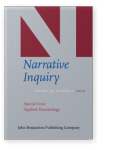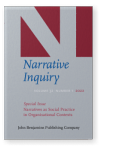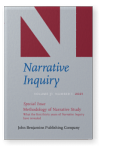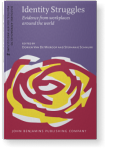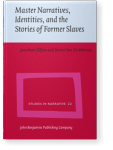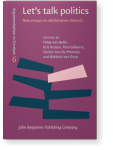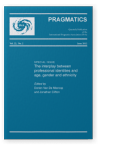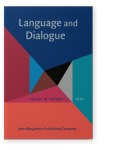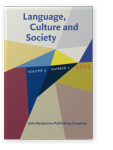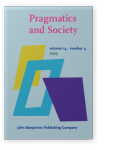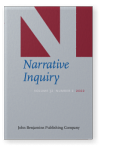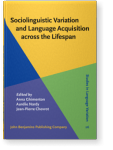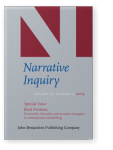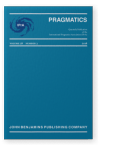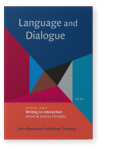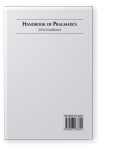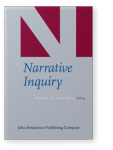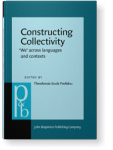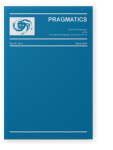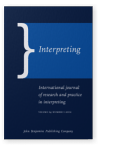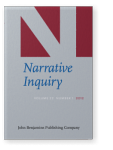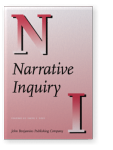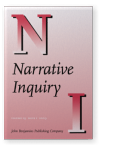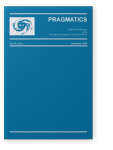Dorien Van De Mieroop
List of John Benjamins publications for which Dorien Van De Mieroop plays a role.
Journal
Narratives as Social Practice in Organisational Contexts
Edited by Dorien Van De Mieroop, Jonathan Clifton and Stephanie Schnurr
Special issue of Narrative Inquiry 32:1 (2022) vi, 243 pp.
Subjects Cognition and language | Discourse studies | Narrative Studies
Methodology of Narrative Study: What the first thirty years of Narrative Inquiry have revealed
Edited by Allyssa McCabe and Dorien Van De Mieroop
Special issue of Narrative Inquiry 31:1 (2021) vi, 262 pp.
Subjects Cognition and language | Discourse studies | Narrative Studies
Identity Struggles: Evidence from workplaces around the world
Edited by Dorien Van De Mieroop and Stephanie Schnurr
[Discourse Approaches to Politics, Society and Culture, 69] 2017. xi, 457 pp.
Subjects Communication Studies | Discourse studies | Pragmatics
Master Narratives, Identities, and the Stories of Former Slaves
Jonathan Clifton and Dorien Van De Mieroop
[Studies in Narrative, 22] 2016. viii, 229 pp.
Subjects Anthropological Linguistics | Communication Studies | Discourse studies | Narrative Studies | Pragmatics | Sociolinguistics and Dialectology
Let's talk politics: New essays on deliberative rhetoric
Edited by Hilde Van Belle, Kris Rutten, Paul Gillaerts, Dorien Van De Mieroop and Baldwin Van Gorp
[Argumentation in Context, 6] 2014. viii, 208 pp.
Subjects Communication Studies | Philosophy | Pragmatics
The interplay between professional identities and age, gender and ethnicity
Edited by Dorien Van De Mieroop and Jonathan Clifton
Special issue of Pragmatics 22:2 (2012) ca. 125 pp.
Subjects Discourse studies | Pragmatics
2024 Negotiating leader identities through indirect mockery in talk about decision-making in a distributed leadership context Language and Dialogue 14:1, pp. 122–151 | Article
In this article, we scrutinise how humour, and in particular, indirect mockery contributes to the construction of leader identities in talk about decision-making in an organisation characterized by a distributed leadership context. So rather than focusing on decision-making episodes themselves,… read more
2024 A different perspective on epistemics and deontics: Conveying story evaluation through the construction of status-stance relations via direct reported speech Narrative Inquiry: Online-First Articles | Article
Thus far, few studies have investigated the evaluative points narrators may convey through the sequential features of reported exchanges in their stories. In this article, we conduct a micro-oriented narrative analysis on how epistemic and deontic status-stance relations are depicted by… read more
2023 Negotiating identities in stories of anti-Chinese racism during the COVID-19 pandemic Language, Culture and Society 5:1, pp. 43–72 | Article
Since the beginning of the coronavirus pandemic, there has been an upsurge of anti-Chinese racism. This paper investigates the socio-pragmatic processes through which Chinese international students in Belgium discursively deal with othering processes in the stories they tell about racist… read more
2023 Identity gatekeeping in New Work Order organizations: Quality care discussions during performance appraisal interviews Pragmatics and Society 14:4, pp. 519–545 | Article
While much has been written on the transition of organizational life into the New Work Order (NWO) and the effects this has had on employees in language-centered economic spaces, few studies have attempted to tease out how these NWO-expectations have affected less language-centered workplaces.… read more
2022 Catching identities in flight: Sharing stories of discriminatory experiences during workplace small talk Narratives as Social Practice in Organisational Contexts, Van De Mieroop, Dorien, Jonathan Clifton and Stephanie Schnurr (eds.), pp. 196–217 | Article
We present a case study of a small talk sequence in a Belgian workplace between two female colleagues with a migration background, in which they share stories with each other on racial micro-aggressions they personally experienced. We draw on the social practice approach and focus on the… read more
2022 Editorial Narrative Inquiry 32:2, pp. 245–248 | Editorial
2022 Narratives as social practice in organisational contexts: Introduction Narratives as Social Practice in Organisational Contexts, Van De Mieroop, Dorien, Jonathan Clifton and Stephanie Schnurr (eds.), pp. 1–8 | Introduction
2021 Methodology of narrative study: What the first thirty years of Narrative Inquiry have revealed Methodology of Narrative Study: What the first thirty years of Narrative Inquiry have revealed, McCabe, Allyssa and Dorien Van De Mieroop (eds.), pp. 1–3 | Introduction
2021 The Narrative Dimensions Model and an exploration of various narrative genres Methodology of Narrative Study: What the first thirty years of Narrative Inquiry have revealed, McCabe, Allyssa and Dorien Van De Mieroop (eds.), pp. 4–27 | Article
In the last few decades, the analytical scope of narrative studies has widened from a sole focus on “prototypical” narratives of personal experience to a wide variety of narrative genres. However interesting this may be, there are also some problems with these genres as there is not only… read more
2021 Chapter 3. The alternation between standard and vernacular pronouns by Belgian Dutch parents in child-oriented control acts Sociolinguistic Variation and Language Acquisition across the Lifespan, Ghimenton, Anna, Aurélie Nardy and Jean-Pierre Chevrot (eds.), pp. 51–80 | Chapter
This paper studies the social meaning of standard and vernacular pronouns of address in Dutch by zooming in on the position they hold in parents’ control acts to their children. Linking the hyperstandardized linguistic situation in Flanders with the Western-European ideal of democratic parenting,… read more
2019 Adjusting to new “truths”: The relation between the spatio-temporal context and identity work in repeated WWII-testimonies Real Fictions: Fictionality, factuality and narrative strategies in contemporary storytelling, Browse, Sam, Alison Gibbons and Mari Hatavara (eds.), pp. 268–292 | Article
In this article, we study the diachronic (re)construction of repeated WWII-testimonies. Specifically, we scrutinize how shifting master narratives in the social context may affect how stories are told in a particular time and place. We selected testimonies by two Belgian concentration camp… read more
2018 The multimodal enactment of deontic and epistemic authority in Indian meetings Pragmatics 28:3, pp. 333–360 | Article
Authority is a much discussed topic in organizational literature, but its in situ enactment is little investigated. Using the notions of deontic and epistemic authority and using multimodal conversation analysis as a research methodology, the purpose of this paper is to provide an empirical… read more
2017 Chapter 8. Indian women at work: Struggling between visibility and invisibility Identity Struggles: Evidence from workplaces around the world, Van De Mieroop, Dorien and Stephanie Schnurr (eds.), pp. 147–164 | Chapter
Over the last two decades, an increasing number of women have joined the Indian workforce, but, as Indian society is still largely patriarchal, they struggle for full membership in the professional ingroup. Drawing on Lewis and Simpson’s ‘(In)visibility Vortex’ (2012), we… read more
2017 Chapter 12. Identities on a learning curve: Female migrant narratives and the construction of identities of (non)participation in Communities of Practice Identity Struggles: Evidence from workplaces around the world, Van De Mieroop, Dorien and Stephanie Schnurr (eds.), pp. 225–240 | Chapter
Recent large scale immigration to Europe means that it is now faced with questions of identity that present immense challenges and opportunities which carry with them huge social, political and economic stakes. Using narrative analysis as a methodology and Lave and Wenger’s notion… read more
2017 Chapter 1. Introduction: A kaleidoscopic view of identity struggles at work Identity Struggles: Evidence from workplaces around the world, Van De Mieroop, Dorien and Stephanie Schnurr (eds.), pp. 1–18 | Chapter
2017 Chapter 24. Epilogue: Identity struggles as a reflection of knowledge, competing norms, and attempts for social change Identity Struggles: Evidence from workplaces around the world, Van De Mieroop, Dorien and Stephanie Schnurr (eds.), pp. 445–454 | Chapter
2016 The interactional history of examples and parentheses: Note-taking practices in multiparty interaction among attendees of a mutual-help group for Chronic Fatigue Syndrome (CFS) sufferers Writing in interaction, Mondada, Lorenza (ed.), pp. 110–139 | Article
In this article, we set out to examine how participants organize their note-taking while engaged in multiparty interaction. We first describe the collective display of affiliation as an interactional practice that allows note-takers to identify recordables and to legitimize their writing. We then… read more
2016 Life stories Handbook of Pragmatics: 2016 Installment, Östman, Jan-Ola and Jef Verschueren (eds.) | Chapter
2014 Positioning oneself in relation to larger collectivities in expatriates’ workplace narratives Narrative Inquiry 24:2, pp. 386–407 | Article
This article aims to explore narratives as sites for identity construction by employing the concept of positioning to analyse some of the discursive processes through which identity construction is accomplished in institutional contexts. Our specific foci are i) the ways in which individuals… read more
2014 On the use of ‘we’ in Flemish World War II interviews Constructing Collectivity: 'We' across languages and contexts, Pavlidou, Theodossia-Soula (ed.), pp. 309–330 | Article
This chapter focuses on the ‘we’-form and its relation to identity construction in fifteen World War II narratives elicited by interviews. First, I address this issue from a quantitative perspective by mirroring the pronominal usage of the interviewer and the interviewee and by executing a… read more
2014 The discursive management of identity in interviews with female former colonials of the Belgian Congo: Scrutinizing the role of the interviewer Pragmatics 24:1, pp. 131–155 | Article
Whilst interviews are often regarded as an essential tool for social science, it has long been recognized that the interviewer has a formative role in the locally situated socio-communicative events that interviews are. Using transcripts of interviews elicited from female former colonials in the… read more
2012 The discursive construction of gender, ethnicity and the workplace in second generation immigrants’ narratives the case of moroccan women in belgium The interplay between professional identities and age, gender and ethnicity, Van De Mieroop, Dorien and Jonathan Clifton (eds.), pp. 301–325 | Article
This article examines the professional identity construction of three young 2nd generation immigrant women of Moroccan descent who have university degrees and high-skilled jobs. More specifically, I focus on how they construct this professional identity in relation to their gender and ethnicity.… read more
2012 The quotative ‘he/she says’ in interpreted doctor–patient interaction Interpreting 14:1, pp. 92–117 | Article
This article examines the different functions of the quotative ‘he/she says’ in an interpreter’s renderings during four medical interviews (Dutch/Russian). First, the quotative is typically used for renderings of doctors’ turns, where it serves to signal a switch in the participation framework and… read more
2012 Maneuvering between the individual and the social dimensions of narratives in a poor man’s discursive negotiation of stigma Narrative Inquiry 22:1, pp. 122–145 | Article
In current Western consumer societies, the poor are excluded and occupy stigmatized positions. By analyzing an interview with a poor man, I look at how stigma is discursively negotiated through the interplay between individual and social dimensions of narratives. First, the interviewee resists the… read more
2012 The interplay between professional identities and age, gender and ethnicity introduction The interplay between professional identities and age, gender and ethnicity, Van De Mieroop, Dorien and Jonathan Clifton (eds.), pp. 193–201 | Article
2012 Negotiating discursive norms: Community interpreting in a Belgian rest home Interpreting 14:1, pp. 23–54 | Article
In spite of the theoretically clearly defined task of an interpreter to translate only what was said by the other interlocutors, naturally occurring data taken from interpreted interactions show quite a different picture, as many previous studies have already indicated. The discursive norms to… read more
2011 Standardized relational pairs in interviews with former slaves: Construction, negotiation and alignment Narrative Inquiry 21:1, pp. 44–67 | Article
We investigate the use of standardized relational pairs (SRPs) and the way narrators align with these in two interviews with former slaves which were conducted in the 1940s. In particular, we look at stories in which slaves are compared to animals, thus not only invoking the SRP master/slave, but… read more
2009 A good story or a good identity? The reportability of stories interfering with the construction of a morally acceptable identity Narrative Inquiry 19:1, pp. 69–90 | Article
Big stories are typically characterized by a high degree of reflexivity, which results in the construction of a fairly coherent — or even “rehearsed” — identity that is acceptable from a contemporary viewpoint. This article focuses on the life story of a former SS Leibstandarte soldier elicited by… read more
2008 Co-constructing identities in speeches: How the construction of an ‘other’ identity is defining for the ‘self’ identity and vice versa Pragmatics 18:3, pp. 491–509 | Article
This paper investigates the way speakers construct their identities as representatives of their companies (institutional identity construction) in relation to the way they “project” an identity onto their audiences. The audience is “altercasted” (Weinstein and Deutschberger 1963) in the role of… read more
